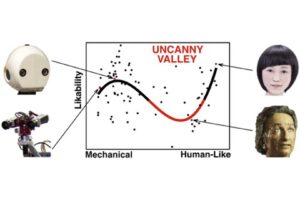Switch your language, you’ll be admired, change your accent, you’ll be despised.
There is an interesting phenomenon present in movies, videogames and painting, thus mostly recurring in the visual arts, named the «Valley of the Uncanny».

If you were to depict someone on a visual medium you could either do it in a simply cartoonish drawing or in a realistic manner.
Nevertheless, what would happen if you were to stylize such depiction with something in the middle of both extremes? Well, then you’d be risking to fall in the «Valley of the Uncanny». This happens, when a depiction looks almost realistic, but a certain mistake or imperfection, gives you an effect of eeriness.

Such a phenomenon is surprisingly also present in other areas like language learning.
I am a polyglot and although my skills would be dismissed as common in Africa and Europe, I am -somehow- considered an interesting specimen in my country of birth, Peru.
Some people in my country admire my skills with languages and are more than eager to hear me speak in another tongue.
Nevertheless, as I am a geek for new sounds, sometimes I twist my tongue and play with my accent, as a child would, by changing the pieces of his newly constructed lego car.
If you, my dear reader, were to meet me in a different country than my place of birth and you were to guess my country of origin, by just relying on the accent of my mother tongue… you’d have a pretty difficult task to accomplish, bucko.

Sometimes I sound like a chilean from Santiago, with a vocabulary from Mexico and a raspy voice from Madrid. And of course I don’t mind including jargon from both the peruvian lower and upper classes in my daily speech. I do not speak with a specific accent, but rather with a chaotic mélange of different fonetic sources.
And other peruvians hate it. Hate it. They immediately say to me: «You are peruvian. Speak to me like a peruvian». That is of course if they previously know about my origins.
I now supect that people regard the accent of a person as something intrinsic and unchangeable, which is deeply rooted in its nationality and economic class. Just imagine talking posh to a group of blue-collar cockney speaking londoners. How would these workers feel about this intruder? What if one of the workers one day decided -not jokingly- to speak posh? Would he still be accepted in his circle?
The accent cements the idea that everyone has about you. You are not supposed to learn a new accent unless you are an actor, a speech coach or a funny guy trying to mock it.
But you ARE supposed to learn a new language. Or even encouraged to do so.
You should either speak your mother tongue in your accent, or you should speak a completely different language regardless of the accent. A middle point is unsettling to say the least.
I differ.
If we, as humans, tend to learn new languages, why not alter the accent that we learned from the place where we were born?
Precisely, because of the «Valley of the Uncanny».
Funny.
Radwulf
08/02/2020
